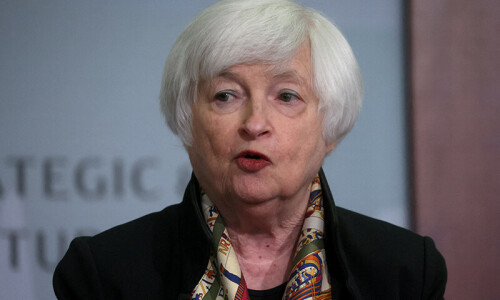HARARE: Zimbabwe’s opposition MDC party on Tuesday claimed victory in the country’s historic elections, setting the scene for a showdown with the ruling ZANU-PF that has held power since independence in 1980.
Senior MDC official Tendai Biti said party leader Nelson Chamisa had won the presidential race, and alleged that the authorities were delaying the publication of results.
“The results show beyond reasonable doubt that we have won the election and that the next president of Zimbabwe is Nelson Chamisa,” Biti told a press conference at the party’s headquarters in Harare. “We are however seriously concerned about evidence of interference ... there is a deliberate delay in announcing the results. This delay is totally unacceptable.”
President Emmerson Mnangagwa, 75, has also said he was confident of victory in Zimbabwe’s first election since former leader Robert Mugabe was ousted in November after 37 years in power.
“The information from our reps on the ground is extremely positive! Waiting patiently for official results as per the constitution,” Mnangagwa said on Twitter early Tuesday.
The rival claims pointed to a contested result, raising the prospect of competing fraud allegations and a possible run-off vote in September -- required if no candidate wins at least 50 per cent of ballots in the first round.
Analysts have said it was unclear whether the country’s generals, who ousted Mugabe and ushered Mnangagwa into office, would accept a win by the Movement for Democratic Change (MDC).
Defeat for the ruling party would likely lead “to a denunciation of the election by the Mnangagwa administration and the potential for the military to intervene to secure power for ZANU-PF,” the London-based BMI risk consultancy said.
‘Free of rigging’
Estimated turnout was around 75 per cent before polls closed on Monday evening after a peaceful day of voting. Full results from the elections — presidential, parliamentary and local — are due by Saturday.
At one polling station in the capital Harare, officials counted large piles of ballots using gas lanterns and candles late into the night on Monday.

If required, Zimbabwe’s 5.6 million registered voters would be asked to return to the polls to vote in a presidential run-off on Sept 8.
Zimbabwe’s much-criticised election authority declared Tuesday that the vote had been free of rigging — even though the count was not yet completed.
“We are absolutely confident there was no rigging ... we at the Zimbabwean Election Commission will not steal [the people’s] choice of leaders, we will not subvert their will,” said ZEC chair Priscilla Chigumba.
EU cites ‘shortcomings’
Once-banned European Union election observers, present for the first time in years, said participation appeared high but warned of possible problems in the polling process.
“There are shortcomings that we have to check. We don’t know yet whether it was a pattern,” EU chief observer Elmar Brok told AFP on Monday.
The bloc will deliver a preliminary report on the conduct of the election on Wednesday, as will the Southern African Development Community (SADC) and the African Union teams.
Mnangagwa, Mugabe’s former right-hand man in ZANU-PF, was the clear election front-runner, benefitting from tacit military support, loyal state media and ruling party controls of government resources.
But Chamisa, 40, a lawyer and pastor who performed strongly on the campaign trail, sought to tap into the youth and urban vote.
The new government must tackle mass unemployment and an economy shattered by the seizure of white-owned farms under Mugabe, the collapse of agriculture, hyperinflation and an investment exodus.
Previously solid health and education services are in ruins, and millions have fled abroad to seek work.
Both candidates had vowed to clean up government and attract foreign investment to create jobs after the isolation and systematic corruption of the Mugabe era.
Published in Dawn, August 1st, 2018














































Dear visitor, the comments section is undergoing an overhaul and will return soon.